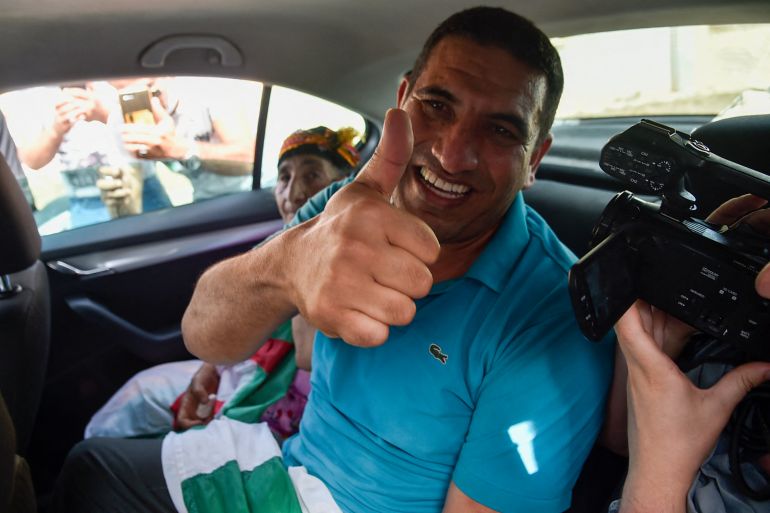Prominent Algerian opposition activist arrested by authorities
Karim Tabbou, a political activist and prominent member of the Algerian Hirak movement, has been arrested several times since 2019.

Algerian opposition figure Karim Tabbou has been taken into custody for unknown reasons, with his brother saying plainclothes police officers took him from his home.
His brother Djaffar posted about the arrest in a Facebook post late on Tuesday, citing lawyer Toufik Belala.
Keep reading
list of 3 itemsAlgeria law ‘controlling media’ close to passing
Algerian journalist Ihsane El Kadi sentenced to five years
Tabbou’s brother added that the activist had not been informed of when he would appear before prosecutors or the charges he might face.
As well as being a prominent member of the Algerian Hirak movement, Tabbou leads a small, unregistered opposition party, the Democratic and Social Union (UDS).
Recurrent arrests
Tabbou, a political activist and opposition figure, gained prominence as one of the leading voices during the Hirak protest movement that began in Algeria in February 2019.
Tabbou was arrested multiple times throughout his activism, with his most notable arrest occurring in September 2019.
He was charged with “inciting violence” and “undermining the integrity of the national territory” following his criticism of the government and his calls for a peaceful transition to democracy.
This was widely seen by many as an attempt by the Algerian authorities to silence dissent and suppress the Hirak movement, and an international outcry ensued, with human rights organisations and activists calling for his release.
He was held in pretrial detention for several months before being sentenced to a one-year prison term in March 2020 for “undermining state security”. In July 2020, his sentence was reduced to a six-month suspended term, and he was released from prison.
Tabbou was arrested again in April 2021 after a complaint was filed against him by Bouzid Lazhari, president of the National Council for Human Rights, an official body.
He was charged with eight counts, including “slander”, after he allegedly heckled Lazhari in public during a funeral, before being released on probation afterwards.
He was detained again in April 2022 for 24 hours for unknown reasons.
What is Hirak?
“The Hirak” (Movement in Arabic) refers to a popular protest movement that emerged in Algeria in February 2019 in response to President Abdelaziz Bouteflika’s announcement of his intention to seek a fifth term in office, despite his declining health and two decades of rule.
The movement was characterised by enormous peaceful protests across the country, demanding political and economic reforms, as well as the removal of longstanding political elites.
Since its inception, the Hirak movement has faced various challenges, including the arrest of activists, restrictions on protests, and attempts by the government to co-opt and control the movement.
The protests initially aimed to prevent Bouteflika’s re-election, but they quickly evolved into broader demands for democratic change and an end to the entrenched political system.
The movement was largely driven by Algerian citizens, including youth, students, activists and professionals, who mobilised through social media platforms.
Demonstrations took place every Friday, with millions of people taking to the streets across Algeria’s major cities, such as Algiers, Oran and Constantine.
The protests were predominantly peaceful, marked by slogans, banners, and singing, reflecting a desire for a peaceful transition of power.
The Hirak was successful in achieving its primary objective, as Bouteflika resigned in April 2019, following pressure from the protests and the military’s withdrawal of support.
The movement continued to demand changes, calling for the dismantling of the ruling elite and the establishment of a democratic and transparent government.